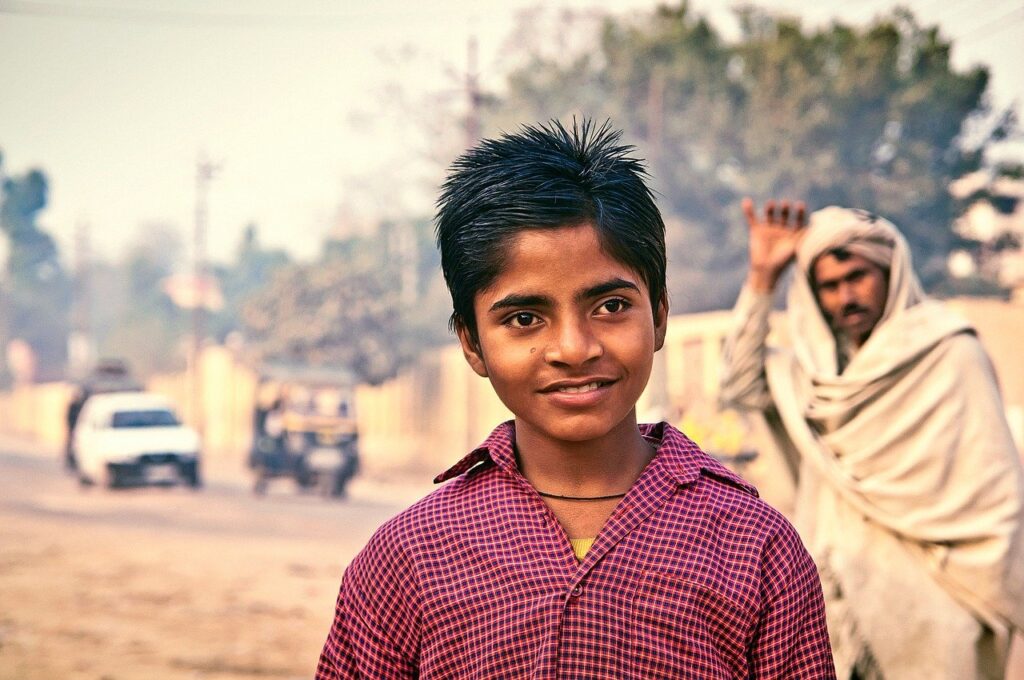You Can’t See Me
– Fiction by Steven Simoncic –
Honourable Mention in the 2020 Dreamers Flash Fiction and Nonfiction Contest.

The bus, like all buses in Hyderabad, smells like lemons… and people. Landlocked and sweltering, Hyderabadians have developed an affinity for citrus scented air freshener. Together we make a musky, lemony, wafty cocktail as the bus leans and lurches down the dirt path, dodging eleven-year-olds on two-stroke motorcycles, and pregnant women riding on the back of scooters driven by men who simultaneously steer and smoke. The old woman next to me, in a once-beautiful saffron sari, is chewing betel nut, spitting the juice through the hole where her bottom teeth used to be. As I look down the bus, the floor is covered with bare feet, homemade sandals fashioned from tires, and fourteen pairs of crisp arctic-white Crocs that belong to the fresh-faced, mildly attractive, midwestern nursing students with whom I’m traveling, who are all named Kayla, Kendra or Kaylee.
Hyderabad is Houston — once provincial – now booming – but with technology instead of oil. The bubble has pushed an already splintering culture ever further apart. So now on any given corner, you can see men standing next to their cars urinating, a dead guy, a nicely appointed Bentley crossover, and scores of homeless beggars, all under the hot glow of the rainbow neon of Google’s newest regional headquarters.
The bus stops. Me, my crew, and fourteen Kaylees walk the 2.3 miles to the village gate. The Kaylees are here to work with lepers. Yes, like Biblical lepers. They still exist. In villages outside of Hyderahouston. And yes, they are missing fingers, legs, and noses. And yes, it is alarmingly sad, and appallingly tragic. But the worst part may be that a leper’s entire family is ostracized to the leper colony – so if Paw-Paw or Nana comes down with the leprosy – their children and grandchildren – all of whom may be completely healthy – are sent to the colony. They are all, famously, deemed untouchable. I’m here to shoot a feel-good video.
My job is to shoot a quasi-documentary of the Kaylees working minor miracles among the Biblically challenged for a video that will play non-stop on their “for-profit” nursing college website. I will spend hours intercutting lepers who look sick, but not too sick, with one of the Kaylees saying things like, I thought I came to give, but I got so much more in return.
Even before I enter the village, I hear it.
Jon-seen-yah
Running up the dirt path is an eight-year old boy. The same boy, that has run up the same path the last three days, yelling the same thing.
Jon-seen-yah!
He thinks I’m John Cena. The 245-pound, WWE heavy-weight-champion-of-fake-wresting John Cena. The third-lead-in-Daddy’s-Home-2, John Cena. The man who turned, you can’t see me, from a catchphrase, to a slogan, to an international tagline. No one, including my eight-year old son, has ever accused me of looking like John Cena. I wear a curved brim baseball cap, and I have a tight, high fade. But that is where it ends. At 165, with no wrestling experience, no IMDB page, no shelf-ass and no abs, I am far from John Cena. But that is all this boy sees when he looks at me. And every day, he meets me at the gate and holds my hand as I carry bags of lenses.
“You’re Jon-seen-yah,” he says.
“I’m not John Cena.”
At lunch he sits on my lap. Smiling. Watching me eat. Touching my baseball cap. Making me say, you can’t see me, over and over again until he’s almost able to repeat it. Over his shoulder, I can see the men of the village standing against a wall, watching me and the boy. They are frail, empty, emasculated. Every time I show the boy a picture I took of him on my phone, or do some other easy, fraudulent trick, he explodes with an incandescence that seems impossible in this place. Each time I glance over his shoulder at the men on the wall, a few more have disappeared.
The truth about my fake documentary is that the Kaylees are about as skilled as a decent counter clerk at CVS. They are first-year nursing students at a college that offers concentrations in things like Heating and Cooling Science. And while the Kaylees are eager and dutiful, their session on how to avoid STDs (in English) to thirty lepers (who don’t speak English), will not make my cut.
The boy brings his friends. They sit cross-legged in a semi-circle around me. And while I can’t understand anything they say, they are exactly like my son and his friends back home. There is the leader, the clown, the little brother, the slow kid… and my guy. He’s a middle-of-the-pack kid. Not the loudest or the biggest or the funniest. But in this moment, he has agency. Because he has something. He has me. He has John Cena.
As the Kaylees demonstrate how to self-exam for breast cancer, my eyes drift to the faces of their small audience. Their eyes are alive with excitement. And even though they don’t understand a word, they nod and smile and are profoundly grateful. Not for learning how to check for themselves breast cancer. But for being seen.
The leader hits the little brother in the back of the head. There is hitting in the colony. Like the smell of the bus, it’s something you get used to faster than you think. The boy reaches into his backpack and pulls out his scrapbook. The yellowed pages are filled with stickers, photos he has torn out of newspapers, and his own pencil drawings of John Cena… and him. He holds the scrapbook out. I take it. Look it over and smile approvingly. I begin to hand it back, and he hands me his pencil.
I sign John Cena.
The boys descend on the scrapbook. I put my baseball cap on his head. He puts his hand in front of his face, the same way he has seen John Cena do it.
You can’t see me, he says.
About the Author – Steven Simoncic

Steven Simoncic’s plays and fiction have appeared in numerous literary magazines and anthologies including The Button Eye Review, Tempered Runes, The Chicago Reader, Hippocampus, Conclave, CRAFT Literary, Beyond Words, New Millennium Writings, Spork Magazine, Ampersand and Drift Magazine. Steven’s work of creative non-fiction, “I Like You” was published in several anthologies and selected as one of the notable American Essays by Robert Atwan in the 2016 Best American Essays anthology. Steven’s play, Heat Wavereceived a critically acclaimed production at Steppenwolf’s Garage Rep, and his play Once Upon a Time in Detroit, was selected as a semi-finalist for the Eugene O’Neill Theater Center’s National Playwrights Conference. The Space Behind Your Heart was selected as a finalist for the Heideman Award from the Actors Theatre of Louisville, and Ghost Gardens was a semi-finalist for the Global Age Project at Aurora Theatre. His play, Broken Fences won a 2018 NAACP award and was featured in The Chicago Tribune’s annual “Best of Chicago” list. Steven holds BBA from the University of Michigan, an MFA from Warren Wilson and an MLA from the University of Chicago. When he’s not writing, Steven is busy making music as a founding member, and one of the principle songwriters, for the band Trickshooter Social Club.
*This story by Steven Simoncic is a Finalist in the Dreamers 2020 Flash Fiction and Nonfiction Contest. See the full results!
Did you like this story by Steven Simoncic? Then you might also like:
Like reading print publications? Consider subscribing to the Dreamers Magazine!